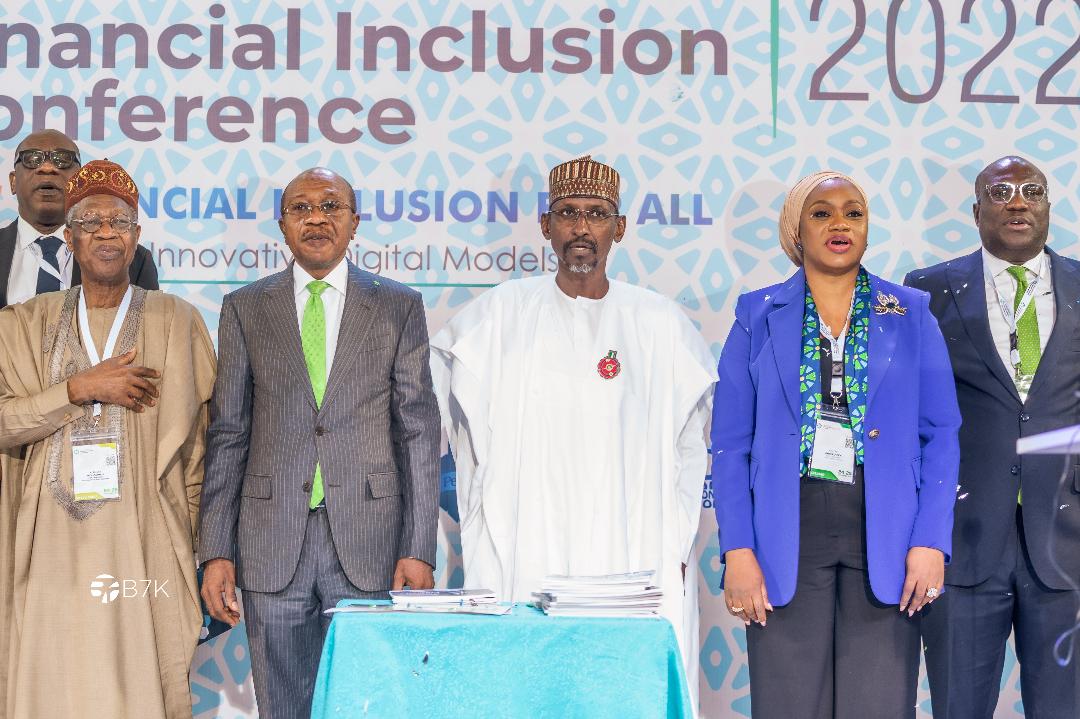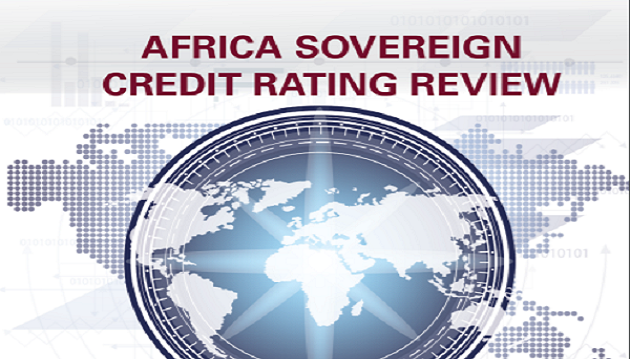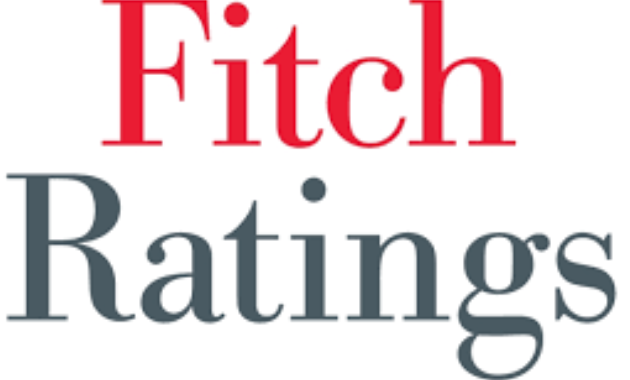E-Financial
Stakeholders Converge at the Maiden International Financial Inclusion Conference, Lead Conversations on Financial Inclusion

Nigeria, on 24th and 25th November 2022 hosted the largest convening of the global Financial Inclusion ecosystem since the launch of its National Financial Inclusion Strategy in 2012.

L-R: Lai Mohammed CON, Minister of Information and Culture; Godwin Emefiele, Governor of the Central Bank of Nigeria; Alhaji Mohammed Musa Bello CON, Minister of the Federal Capital Territory, Nigeria and Aishah N. Ahmad, CFA– Deputy Governor, Central Bank of Nigeria and Philip Yila Yusuf, Director, Development Finance Department, Central Bank of Nigeria at the maiden edition of the International Financial Inclusion Conference 2022, which was held at Transcorp Hilton hotel Abuja on Thursday, November 24th, 2022.
The 2022 International Financial Inclusion Conference organized by the Central Bank of Nigeria (CBN) and its partners within the financial inclusion governance committees themed: “Financial Inclusion for all: Scaling Innovative Digital Models” had in attendance over 5000 participants from at least 78 countries around the world.
Among the major dignitaries in attendance were His Excellency, President Muhammadu Buhari (GCFR), who was represented by the Honorable Minister of the Federal Capital Territory, Mallam Mohammad Musa Bello (CON); United Nations Secretary-General Special Advocate (UNSGSA) on Inclusive Finance, Queen Maxima of the Netherlands; Secretary to the Government of the Federation, Mr. Boss Mustapha; the Honorable Minister for Communication and Digital Economy, Professor Isa Pantami; the Honorable Minister of Women Affairs, Dame Pauline Tallen; the Honorable Minister for Information and Culture, Mr. Lai Mohammed; the Governor of the CBN, Mr Godwin Emefiele, and Dr Kayode Fayemi, former Chairman of the Nigerian Governors Forum and former Governor of Ekiti State.
Also in attendance were financial sector regulators such as the Chairman of the Securities and Exchange Commission, Mr. Femi Lijadu; Managing Director of the NDIC, Mr Hassan Bello; the Commissioner of NAICOM, Mr Sunday Thomas; Board Members of the Central Bank of Nigeria, and the Chief Executive Officer of Brittania-U Nigeria Limited, Mr. Uju Ifejika, amongst others.
During the conference, attendees witnessed the launch of 7 key policies and products that would enable the achievement of 95% Financial Inclusion in Nigeria by 2024 such as the revised National Financial Inclusion Strategy (3.0), the Strategy for Leveraging Agent Networks for Women’s Financial Inclusion, the National Fintech Strategy, the Payment System Vision (PSV) 2025, the Nigeria Financial Services Maps, the CBN Regulatory Sandbox and a Fintech Bridge between the Central Bank of Nigeria and the Central Bank of Egypt.
Giving a keynote address during the conference, the Governor Central Bank of Nigeria – Mr. Godwin Emefiele who chairs the National Financial Inclusion Steering Committee pointed to CBN’s long-standing effort to achieve the financial inclusion targets through creating enabling environments and providing supports.
He said, “From 2012 to date, over 59 policies and initiatives have been implemented by stakeholders to achieve the objectives of financial inclusion.
“These policies and initiatives cut across the banking sector, the insurance sector, the capital market sector and the institutions responsible for infrastructural development for financial inclusion in Nigeria.
“We have prioritized financial inclusion through our invention for over four million smallholder farmers and SMEs creating over two million jobs. By the end of 2024, we aim to be at 95% rate of financial inclusion in Nigeria”.
The Deputy Governor, Financial System Stability, CBN, Mrs. Aishah N. Ahmad, CFA in her welcome remarks highlighted that the conference was holding at a critical time in Nigeria’s Financial Inclusion journey. “Nigeria is indeed at an important tipping point for financial inclusion.
“At no time has there been a prevalence of an enabling regulatory environment, proliferation of digital technology, innovation and collaborative platforms between the public and private sector – all strategic levers required to scale financial inclusion in Nigeria”. In her engaging plenary session, she also stressed the role of policy making in advancing Financial Inclusion in Nigeria.
In a special keynote address by the United Nations Secretary-General Special Advocate (UNSGSA) on Inclusive Finance – Her Majesty Queen Maxima of the Netherlands highlighted the role to be played by the new National Financial Inclusion Strategy in providing a genuine chance for improving livelihoods, such as strategies leveraging the National Insurance Number, Bank Verification Number amongst other policies
The conference featured nine plenary sessions including Scaling Digital Models for the Last Mile, Catalyzing Global Partnerships for Financial Inclusion, Country Experiences, Expert Dialogue on Women’s Financial Inclusion, Fostering Partnerships for Inclusive growth amongst others. Four breakout sessions focused on Digital Infrastructure, Data Privacy & Consumer Protection, Deepening Digital Financial Services and Strategies for reaching Youth & Rural Areas.
Speakers cut across global policy makers and business leaders including Dr Alfred Hannig, Executive Director AFI, Ambassador Chad Blackman, Special Adviser to the DG ILO, Mrs Elsie Addo- Awadzi, Deputy Governor, Bank of Ghana, Mr Folashodun Shonubi, Deputy Governor Operations, CBN, Mr Herbert Wigwe, Managing Director, Access Corporation and Professor Olayinka David-West of Lagos Business School, etc
The IFIC 2022 conference agenda included the first Financial Inclusion Awards Dinner themed ‘Celebrating Champions of Inclusion’. Nine (9) deserving institutions and one individual were recognized for their contributions to advancing financial inclusion in Nigeria through a rigorous nomination and selection process superintended by Price WaterHouse Coopers (PWC).
The winners included Enhancing Financial Innovation and Access (EFINA) who won the Financial Inclusion Innovation Award and Access Bank and Jaiz Bank who won the national women’s financial inclusion award and the inclusive bank of the year award respectively. TeamApt, Remita, Interswitch, E transact, Lapo MFB and Ms Modupe Ladipo also took away awards.
The conference also showcased 20 fintech and start up companies at its Innovation Labs exhibition focusing on various solutions targeted at facilitating payments, digitizing informal financial services platforms and bridging the financial inclusion gap.
E-Financial
African Union Launches Credit Rating Agency to Promote Regional Economic Integration

The African Union has taken a significant step towards promoting economic resilience in Africa with the launch of the African Credit Rating Agency (AfCRA).

The new agency aims to provide a fair, transparent, and unbiased credit rating system, addressing the biases of global rating firms that have reportedly cost Africa over $75 billion in investment opportunities.
According to Kenya’s President, William Ruto, who unveiled the agency at an AU event in Addis Ababa, Ethiopia on Friday, “Global credit rating agencies have not only dealt us a bad hand, they have also deliberately failed Africa.”
Ruto criticized the flawed models, outdated assumptions, and systemic bias used by global rating agencies, which paint an unfair picture of African economies and lead to distorted ratings, exaggerated risks, and unjustifiably high borrowing costs.
The launch of AfCRA is a response to the long-standing grievances of African countries regarding their treatment by international credit rating firms.
The agency aims to provide fair, transparent, and development-focused credit ratings that reflect the realities and potential of African economies.
Improving Africa’s rating by one notch could unlock $15.5 billion in additional funding for the continent, according to Ruto.
The idea of creating an African credit rating agency has been in the pipeline for years, with the AU officially announcing its plans to move forward with the project in September 2023.
The push for an African credit rating agency gained momentum in 2022 when Senegal’s former president Macky Sall called for a new system to “end the injustices” faced by African countries.
The African Credit Rating Agency is part of Africa’s continuous march towards economic resilience, which also includes the recent establishment of the African Energy Bank, headquartered in Nigeria.
The bank aims to provide support to unleash Africa’s energy potential and bring an end to energy poverty on the continent.
E-Financial
Nigeria Worst Hit by Crypto Currency Fraud

Fraud in the crypto industry in African continent has soared by 48 percent over the past year and Nigeria is worst hit according to report by CAJ News.

This is according to the Sumsub State of the Crypto Industry 2025 report, which indicates Nigeria recorded the highest rate of fraud across the sector, at 8,3 percent.
Thus, this percentage of verification attempts were flagged as fraudulent.
Uganda, Kenya and Tanzania all have fraud rates of 4,8 percent, with Cameroon (4,5 percent), Ethiopia (3,7 percent), Ghana (3,5 percent), Algeria (2,6 percent), Benin (2,6 percent) and Morocco (2,1 percent) recording significant rates.
The most popular fraud types are document forgery (affecting 31 percent of surveyed companies), phishing (20 percent) and money mulling (15 percent), followed by account takeover (14 percent) and forced verification (12percent).
Simsub, the cyber crime expert, believes this surge highlights the need for companies to adopt artificial intelligence (AI)-powered detection, biometrics and continuous monitoring to enhance security.
The report states that innovations like biometric checks, AI-backed automation and document-free verification have boosted crypto platform users’ on-boarding success rates to 93,39 percent and reduced verification time by 46 percent, overall improving customer on-boarding while reducing drop-off cases.
Hannes Bezuidenhout, Vice President of Business Development (Africa) at Sumsub, said Africa’s growing adoption of crypto provided its own challenges, but the company foresaw increasing demand and growing user expectations across the continent.
“So it’s crucial for VASPs operating in the region to implement secure verification systems and stay vigilant to fraud, while keeping an eye on evolving and new regulations concerning the crypto sector to avoid fines.”
VASP is an acronym for virtual asset service provider.
E-Financial
Banking Consolidation Less Likely as Nigerian Banks Meet Capital Requirements – Fitch

Fitch Ratings has said that Nigerian banks are making significant progress in raising core capital to meet new paid-in capital requirements. The rating agency noted that the banks are generally on track to meet the end-of-first quarter (Q1) 2026 deadline.

This is supporting a recovery in capitalisation from the impact of naira devaluation, providing fuel for business growth. It also reduces the likelihood of significant banking sector consolidation.
In March 2024, the Central Bank of Nigeria announced a significant increase in paid-in capital requirements (share capital plus share premium) for commercial, merchant and non-interest banks.
Banks have three ways to comply – through equity injections, M&A and downgrading their licence authorisation.
Fitch-rated banks have made notable progress towards compliance. Almost all have raised capital or formally launched the process to do so.
The two largest banks, Access Holdings and Zenith Bank, are the first to secure enough fresh capital to meet the N500 billion requirement for an international licence. First HoldCo, United Bank for Africa and Guaranty Trust Holding Company are taking a phased approach.
They have recently raised capital and have shareholder approval to begin raising more to meet the N500 billion requirement. First HoldCo’s and United Bank for Africa’s recent rights issues are awaiting final regulatory approval.
Fidelity Bank and FCMB Group have completed initial capital raisings but will need to raise more to maintain their international licences. As second-tier banks, they must raise significantly more capital relative to their balance sheets than larger banks.
They have extraordinary general meeting approval for this, although they could consider downgrading to a national licence as they each have just one foreign subsidiary.
Ecobank Nigeria Limited (ENG) and Jaiz Bank needed only small capital injections to meet their requirements and have already achieved compliance. We estimate that ENG is still in breach of its total capital adequacy ratio (CAR) requirement of 10 percent but it has further capital-raising plans to restore compliance. Stanbic IBTC Holdings has launched a rights issue to raise capital to maintain its national licence.
Strong investor appetite has ensured that the vast majority of capital raisings so far have been successful, and most first- and second-tier banks should be able to meet their new capital requirements through capital raisings alone. Therefore, we believe the likelihood of banking sector consolidation among first- and second-tier banks has decreased.
Union Bank of Nigeria (UBN), which is also in breach of its 10 percent CAR requirement, and third-tier banks have generally been slower to raise capital. Wema Bank has shareholder approval to raise enough capital to retain its national licence and plans to launch the process in April.
Coronation Merchant Bank recently received board approval. It is not clear whether UBN and unrated third-tier banks have received the necessary approvals. M&A activity and licence downgrades remain more likely among third-tier banks.
The capital raisings are contributing to a recovery in capitalisation from the impact of naira devaluation, which put pressure on capital ratios and increased US dollar credit concentration risks. Strengthened buffers over minimum CAR requirements will mitigate risks from a challenging operating environment, including regulatory intervention and further naira volatility, while providing room for business growth.
The capital raisings are unlikely to lead to banks with Long-Term Issuer Default Ratings (IDRs) of ‘B-’ being upgraded given the constraint of Nigeria’s ‘B-’/Positive Long-Term IDR.
However, they could contribute to Outlook revisions to Positive for some banks, and, providing CAR compliance is restored, to upgrades for UBN and ENG (both rated ‘CCC’). Capital raisings are more likely to affect National Long-Term Ratings, which measure the relative creditworthiness of Nigerian issuers.

 E-Business3 days ago
E-Business3 days agoSchmidt, Ex Google Chief Says AI Risky in Terrorist Hands

 News3 days ago
News3 days agoFG Order MDAs to Close Commercial Banks’ Accounts, Enforce TSA Policy

 News2 days ago
News2 days agoTikTok Returns on Apple, Google US App Stores as Trump Delays Ban

 General News2 days ago
General News2 days agoResearchers Develop Innovative Treatment for Malaria

 Telecom2 days ago
Telecom2 days agoVisa Launches Report on Digital Payment Landscape in Nigeria, Shows Positive Outlook

 E-Financial2 days ago
E-Financial2 days agoAfrican Union Launches Credit Rating Agency to Promote Regional Economic Integration

 E-Financial3 days ago
E-Financial3 days agoNigeria Worst Hit by Crypto Currency Fraud

 Telecom3 days ago
Telecom3 days agoSalesforce Collaborates with Tech Leaders to Launch AI Energy Score for Model Efficiency























